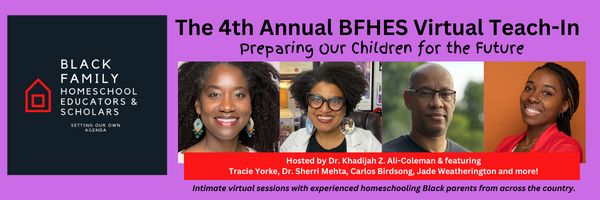Mark your calendars for Saturday, January 20, 2024, as Black Family Homeschool Educators and Scholars, LLC (BFHES) embark on a transformative day of insightful sessions centered around the theme, “Preparing Our Children for the Future.” Today is the last day to register.
About the Teach-In: Black families have long been pioneers in the realm of homeschooling, a legacy that predates the global pandemic. The BFHES Annual Virtual Teach-In is a unique gathering that brings together Black home educators to set our own agenda and discuss issues vital to Black families. It serves as an excellent starting point for new homeschooling families. Register here.
Who Should Attend:
- Black Homeschooling Parents
- Educators Serving Black Homeschooling Families
Why Attend: Participate in a unique opportunity to engage with like-minded individuals, gain valuable insights, and contribute to the growth of a powerful network of Black home educators. Whether you’re a homeschooling newbie, a seasoned parent, an educator, or a researcher, this teach-in is your chance to be part of a supportive community dedicated to preparing our children for a bright future.
Registration Details: Registrants have the option to purchase an all-day pass to the teach-in for $30 or buy individual access to each session for $10 each.
Date and Time:
- Date: Saturday, January 20, 2024
- Time: 12pm-6pm EST
Platform: Virtual via Zoom (Link will be provided the day before the teach-in registration)
BFHES History: BFHES, established in April 2020 by Black homeschool researchers Dr. Khadijah Ali-Coleman and Dr. Cheryl Fields-Smith, has evolved into a groundbreaking educational research group. Dr. Ali-Coleman’s journey from defending her doctoral dissertation on dual-enrolled African American homeschooled students to creating an anthology of voices on Black homeschooling reflects the organization’s commitment to expanding the research literature and amplifying Black voices.
In summer 2020, BFHES organized its inaugural Virtual Teach-In, attracting over 200 participants for a seven-day event. The event also coincided with a call for submissions for the book, “Homeschooling Black Children in the US: Theory, Practice & Popular Culture,” which was released in 2022. The BFHES organization became the editorial team managing the Information Age Publishing series, “Contemporary Perspectives on Black Homeschooling.”
Since the parting of ways with Dr. Fields-Smith in late 2021, Dr. Ali-Coleman is the sole owner and managing director of BFHES, formally registered in Maryland but with a national reach. The organization continues to engage the community through its podcast, “Contemporary Perspectives on Black Homeschooling,” and a thriving Facebook community with over 3000 members.
Mission Evolution: BFHES has shifted its focus since January 2022, aiming to train Black parents in homeschooling best practices and youth development theory. The organization seeks to connect families with resources and opportunities to optimize their homeschooling practice. As the first US-based research and education group dedicated specifically to the topic of Black family homeschooling, BFHES is at the forefront of empowering Black families in their homeschooling journey. Learn more at BlackFamilyHomeschool.org




